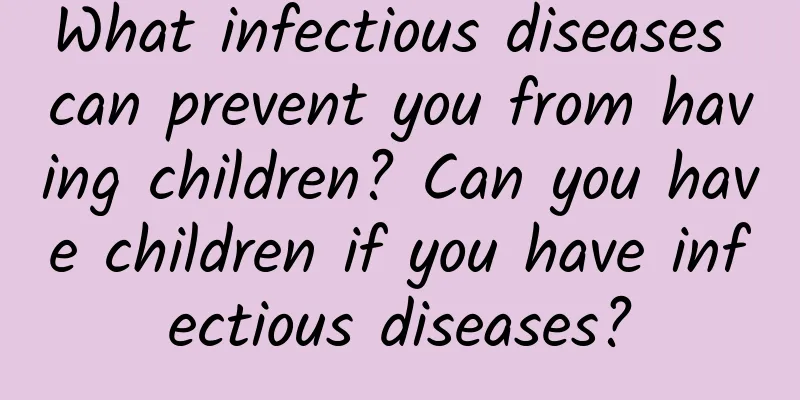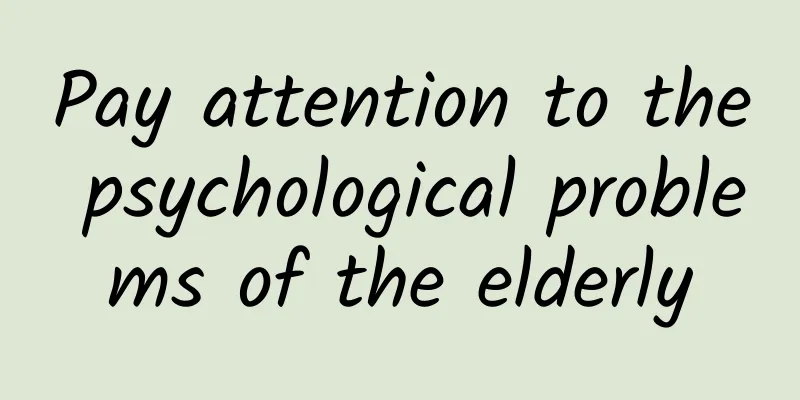What infectious diseases can prevent you from having children? Can you have children if you have infectious diseases?

|
Before getting married or pregnant, there are premarital and pregnancy checkups to be done in order to be responsible for the couple and their offspring and avoid giving birth to sick children. This includes checking for infectious diseases, such as AIDS, syphilis, hepatitis B and hepatitis C, etc. So what are the infectious diseases that can prevent children from being born? What infectious diseases can't have children?The infectious diseases that are medically considered to affect marriage and childbearing as stipulated in my country's "Law on the Prevention and Control of Infectious Diseases" include: (1) Designated infectious diseases:Viral hepatitis (hepatitis B, hepatitis C), tuberculosis, syphilis, gonorrhea, Chlamydia trachomatis infection, AIDS, genital warts (2) Female reproductive system infection:The most common diseases include vulvitis, Candida vaginitis, Trichomonas vaginitis, bacterial vaginosis, pelvic inflammatory disease, etc. Can I have a baby if I have an infectious disease?Syphilis infection during pregnancy can cause congenital syphilis, premature birth, stillbirth, etc. Gonorrhea and genital warts are not only transmitted through sexual contact, but also through contaminated clothing, bath towels, bathtubs, etc., which can cause infertility or ectopic pregnancy in women and trigger prostatitis in men. Genital Chlamydia trachomatis infection can cause female pelvic infection, endometritis, and salpingitis, resulting in infertility or ectopic pregnancy. Infection in pregnant women can cause intrauterine infection of the fetus, resulting in miscarriage, premature birth, etc. AIDS is a fatal infectious disease that is transmitted through sexual intercourse, blood, and mother-to-child transmission. Except for tuberculosis, all other infectious diseases that can affect marriage and childbearing can be transmitted through sexual contact, vertical transmission from mother to child, or infection of children or newborns through the birth canal. Once these infectious diseases are diagnosed, they need to be treated regularly before childbearing, and disease intervention should be carried out in advance for newborns. These infectious diseases are highly harmful and difficult or impossible to cure, so early examination and treatment are crucial for both husband and wife. At present, premarital examinations are not mandatory in my country, and are not standardized in many places. At present, maternal and child health care routinely includes AIDS, syphilis, hepatitis B and hepatitis C, also known as the four infectious diseases, and the others are included in special examinations. Can I have a baby if I have AIDS?It is possible to have children even if you have AIDS. If timely intervention is carried out early and effective medical treatment is used, HIV-positive mothers still have a 99% chance of giving birth to healthy children. The premise is that mothers with AIDS need to receive regular and systematic anti-HIV treatment. Please follow the doctor's instructions. |
Recommend
At what age is it normal for girls to have their periods?
Every woman has her period. Generally speaking, a...
What should breastfeeding mothers eat to replenish qi and blood
As we all know, women need to breastfeed after gi...
What medicine is used for candidal vaginitis?
Since women experience menstruation every month, ...
Are there any obvious symptoms of uterine cold?
Uterine cold refers to the coldness of the female...
How long does it take to get your period after breastfeeding?
After giving birth, a woman needs to stay in conf...
Will cervical erosion affect pregnancy?
Will cervical erosion affect female conception? C...
What is the knowledge about weight loss for women?
Every woman pays great attention to her figure an...
What skin care products are good for autumn? How to take care of dry skin in autumn
Many of you may think that you only need to apply...
Women who eat eggs like this every day will cause premature ovarian failure
Premature ovarian failure refers to the symptoms ...
What to eat to protect the uterus
The uterus is very important to our female friend...
What causes intermittent pain in the left lower abdomen of women?
I believe that many women have experienced abdomi...
Membrane rupture time
It is not good if the amniotic membrane ruptures ...
What's the matter with no virgin blood?
Virgin blood is something that happens to virgins...
Causes of uterine adhesions
Women need to protect themselves well. There are ...









